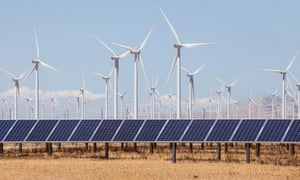Extract from The Guardian
Exclusive: farm gets the green light to be built by Chinese companies after $9.9m grant from renewable energy agency


Australia’s first large-scale hybrid wind and solar farm is set to be built near Canberra, with the Australian Renewable Energy Agency (Arena) providing a $9.9m grant.
The money would go towards the $26m cost of building a 10MW solar photovoltaic plant alongside the existing Gullen Range windfarm.
Goldwind, one of the Chinese companies that will build and operate the project, said the solar farm was expected to generate about 22,000 MWh of electricity in the first year of operation, enough to supply about 3,000 homes.
Building the solar farm on the same location as the windfarm meant 20% could be saved from the construction costs of the solar farm, said Ivor Frischknecht, the chief executive of Arena.
Arena recently commissioned an investigation into the costs and benefits of hybrid solar and windfarms.
It found that besides huge cost savings – achieved mostly because the grid connection was able to be shared by the two generators – the two energy sources were often complementary, producing peak outputs at different times of both the day and year. That meant they combined to create a more reliable energy source.
“Co-location provides more continuous energy generation as windfarms tend to generate more energy overnight whilst solar only generates during the day,” Frischknecht said. “Gullen windfarm generates more power in winter and the new solar farm will generate more in summer.”
Frischknecht said he hoped that, by building the first example of a combined solar and windfarm, others would follow.
“This is the first project of its type in Australia, so the lessons learned will be invaluable,” he said. “It has the potential to provide a blueprint for future projects and cement industry confidence in the approach.”
Since the costs of connecting the solar farm to the grid were almost eliminated, there was less need for the farms to be very large just to recoup those costs. He said that meant the co-location strategy could unlock medium-scale PV projects.
The project is expected to be completed in July 2017. It will be built and owned by two Chinese companies – Goldwind and Beijing and Jingneng Clean Energy – which own and operate the existing wind farm.
After the Arena grant of $10m, another $10m is being lent to the project by National Australia Bank and the Industrial and Commercial Bank of China, leaving the existing windfarm to fund the remaining $6m.
The money would go towards the $26m cost of building a 10MW solar photovoltaic plant alongside the existing Gullen Range windfarm.
Goldwind, one of the Chinese companies that will build and operate the project, said the solar farm was expected to generate about 22,000 MWh of electricity in the first year of operation, enough to supply about 3,000 homes.
Building the solar farm on the same location as the windfarm meant 20% could be saved from the construction costs of the solar farm, said Ivor Frischknecht, the chief executive of Arena.
Arena recently commissioned an investigation into the costs and benefits of hybrid solar and windfarms.
It found that besides huge cost savings – achieved mostly because the grid connection was able to be shared by the two generators – the two energy sources were often complementary, producing peak outputs at different times of both the day and year. That meant they combined to create a more reliable energy source.
“Co-location provides more continuous energy generation as windfarms tend to generate more energy overnight whilst solar only generates during the day,” Frischknecht said. “Gullen windfarm generates more power in winter and the new solar farm will generate more in summer.”
Frischknecht said he hoped that, by building the first example of a combined solar and windfarm, others would follow.
“This is the first project of its type in Australia, so the lessons learned will be invaluable,” he said. “It has the potential to provide a blueprint for future projects and cement industry confidence in the approach.”
Since the costs of connecting the solar farm to the grid were almost eliminated, there was less need for the farms to be very large just to recoup those costs. He said that meant the co-location strategy could unlock medium-scale PV projects.
The project is expected to be completed in July 2017. It will be built and owned by two Chinese companies – Goldwind and Beijing and Jingneng Clean Energy – which own and operate the existing wind farm.
After the Arena grant of $10m, another $10m is being lent to the project by National Australia Bank and the Industrial and Commercial Bank of China, leaving the existing windfarm to fund the remaining $6m.
No comments:
Post a Comment